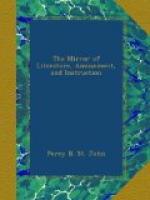In Kamtschatka, Greenland, Lapland, and Iceland, there are no cats, nor does the lynx in Europe extend farther than Norway.—Ibid.
VESSELS MADE OF THE PAPYRUS.
The last number of the Magazine of Natural History contains an article of great interest, on Vessels made of the Papyrus, illustrated with cuts, from which it appears that vessels have from the earliest times, been formed from the paper reed, and that they are at present in use in Egypt and Abyssinia. The author is John Hogg, Esq. M.A. F.L.S. &c. whose antiquarian attainments have greatly assisted him in the elucidation of this very curious subject.
REMAINS OF LA PEROUSE.[10]
M. Derville, who commanded the Astrolabe, in the lute-voyage undertaken to search for traces of the expedition of La Perouse, considers the island, the summits of which were observed fifteen leagues to windward, by the frigates La Recherche and L’Esperance, which composed the expedition of Admiral D’Entrecasteaux, in 1793, and to which the name of the Isle de la Recherche was then given, to be the identical island, Vanikoro (or Vanicolo) on the shores of which the remnants of La Perouse’s vessel have been found. The geographical position of latitude and longitude of the Isle of Vanikoro, agrees exactly with that of the island to which the name of Recherche was given by D’Entrecasteaux. That island was then confounded with the number of other islands, which had been seen by the expedition, and which it had been found impossible to examine in detail.—Athenaeum.
STUDY OF CHEMISTRY.
Numbers there are, far above the lower classes, who still consider the elements of all things as consisting of earth, air, fire, and water; an error which classical-learning, no less than the expressions of common parlance, tends to perpetuate. Let us hope that the days are at hand, if not already arrived, in which the acquirement of such fundamental knowledge will be looked upon as at least equally necessary with the study of languages, and the cultivation of taste and imagination.—Library of Useful Knowledge.
[Footnote 10: For a Report of this discovery, see MIRROR, vol. xiii p. 409.]
* * * * *
THE GATHERER.
A snapper up of unconsidered trifles.—SHAKSPEARE.
* * * * *
ORIGIN OF THE WORD WORSTED.
Worsted, in the county of Norfolk, though formerly a town of considerable trade, and much celebrity, is now reduced to a village, and the manufactures, which obtained a name from the place, are removed to Norwich and its vicinity.
Shakspeare has not been very courteous towards the worsted gentry; had he lived in our times, they might have worsted him for a libel: he says in King Lear, “A base, proud, shallow, beggarly, three suited, hundred pound, filthy, worsted stocking knave.”




